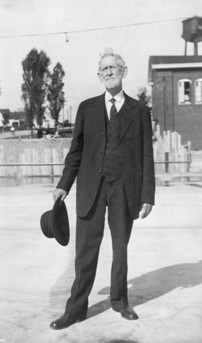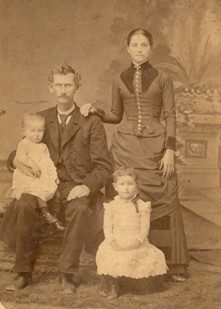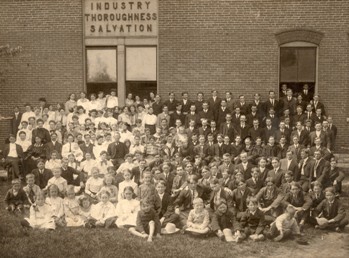The Origin of Asbury College
“The Origin of Asbury College”
by John Wesley Hughes, Founder and First President
 The following was abridged from the tenth chapter (of the same name) of John Wesley Hughes’ 1923 Autobiography. Some editorial license was taken for succinctness and ease of reading.
The following was abridged from the tenth chapter (of the same name) of John Wesley Hughes’ 1923 Autobiography. Some editorial license was taken for succinctness and ease of reading.
After twelve years in the pastorate and one in the evangelistic field I received a clarion call to college work. Of all calls this was the most unthought of, unexpected, and undesired. My call to repentance and salvation was gladly received; my call to the ministry was hesitatingly received, because I felt my inability and unpreparedness; my call to holiness and full salvation was earnestly sought and joyfully accepted, for my heart had hungered long and earnestly for something, I did not know what, but when I did obtain it, my soul was thoroughly satisfied. My call to college work was clear, but bewildering as I considered what seemed my utter inability and unfitness.
I had seen and felt the need for years of a real salvation school where religious young men and women could hold their salvation; and where unsaved and unsanctified students would not only be encouraged, but urged to get saved and sanctified and prepared educationally for their life’s work. Those who were fully saved and educationally equipped would be urged by faculty and fellow students to hold themselves in readiness to say to the Lord and the church, as did Isaiah in his vision of God and His holiness and a lost world in its sin: “Also, I heard the voice of the Lord saying, ‘Whom shall I send, and who will go for us?’ Then said I, ‘Here am I; send me'” (Isaiah 6:8).
This would be a school where the religious atmosphere might be such that the students would recognize the world’s need and willingly obey the Lord’s command. “But when He saw the multitude He was moved with compassion on them, because they fainted and were scattered abroad as sheep having no shepherd. Then said He unto His disciples, ‘The harvest is plenteous, but the laborers are few, pray ye therefore the Lord of the harvest that He will send forth laborers into His harvest'” (Matthew 9:36-38).
I believed then, as I do now, that a rounded and complete education involved a genuine Christian experience. To educate the body to the neglect of the mind and the soul makes a man beastly. To educate the mind to the neglect of body and soul leads to dead intellectualism. To educate the soul to the neglect of mind and body results in fanaticism.
I also believed then, as I do now, that a real Christian school would put the Bible in the curriculum, teaching the history, doctrine, and experience of our holy Christianity daily, stressing the teaching of Jesus, “Seek ye first the kingdom of God and His righteousness, and all these things shall be added unto you” (Matthew 6:33). For many years I had been sending young men and women, full of faith and the Holy Ghost, out of my revivals to colleges to get them prepared for the Master’s service. A great percent of them, as they do now, got their faith destroyed and lost their religious experience and the call of God to the ministry and other Christian work.
One day as I sat in the old Kentucky Central Depot, Lexington, Kentucky, having been from my home in Carlisle, Kentucky, for a month in evangelistic work, God not only gave me a vision of a real salvation school, but called me to the work. I purchased my ticket for Carlisle, my home. I got on the train and pulled my hat down over my face so that no one could interfere with my prayer and meditation till I reached my destination.
 I spent part of the time in the bosom of my family with my wife and three children, but I spent hours each day in my room in agonizing prayer with heavy heart and perplexed mind, hoping in some way to rid myself of what seemed to me a fearful responsibility one that I was in no way prepared to shoulder. I hoped and prayed that God would relieve me of the burden, but as I could get no relief from that direction, I was hopeful that my wife, who had been so faithful and true to me in my work, both in the pastorate and evangelical fields, would enter her protest against my entrance into this untried field. So I called her to my room.
I spent part of the time in the bosom of my family with my wife and three children, but I spent hours each day in my room in agonizing prayer with heavy heart and perplexed mind, hoping in some way to rid myself of what seemed to me a fearful responsibility one that I was in no way prepared to shoulder. I hoped and prayed that God would relieve me of the burden, but as I could get no relief from that direction, I was hopeful that my wife, who had been so faithful and true to me in my work, both in the pastorate and evangelical fields, would enter her protest against my entrance into this untried field. So I called her to my room.
When she came in I was on my face upon the floor praying God to help me break the news to her so as to bring right results. She sat down on the floor by me. I said to her, “I have a matter on my mind to which I must call your undivided attention.” With her characteristic quietness and frankness, she said, “I am all ears and eyes and will hear what you have to say.” When she gave that answer, which implied her willingness to follow me where God would lead, I burst into tears and told her about my call to college work and how perplexed I was over it. Her unexpected answer was, “When I married you, I did it with the understanding that I would follow you into every line of work to which God called you.” I felt then that my last prop had fallen and that I could do nothing but obey God and hope and pray for success in our new divinely appointed field. We at once began to pray and to plan for the beginning of our new project.
The news soon got out that I was about to start a college to be known as a holiness school; that in connection with the college curriculum the Bible would be placed as a regular textbook; and that its history, doctrines, and experiences, as revealed in Bible characters would be taught and emphasized as other textbooks. Also the work of the day would be opened with an earnest religious chapel service – in reading and expounding the Scriptures, singing, praying, and testifying as the Lord would lead. Each teacher would be required to open class with a short invocation by teacher or pupil.
We adopted and followed these plans for twenty-four years of school life. We saw splendid results, not only in the religious life of the student body, but more than ordinary success in all departments of college life. We believed then, and know now, that real piety in the student body has much to do with industry and honest and sincere investigation in all lines of study and college curriculum. Furthermore, the Divine Author who made both the mind and heart will aid the student who leads a life in conformity with His laws, when he goes to Him daily in honest prayer as a child to his father, asking Him to keep his heart full of love and to illuminate his mind so that he may rightly discover and promote the truth on all lines of investigation and honest research.
I then began to look out for a location for the school. A Mr. Slicer at Nepton, Kentucky, who had heard of my project, owned a brick school building in that little town. He offered to donate the building if I would locate the school there. I did not like the location.
Rev. W.S. Grinstead, the pastor of the Methodist Church in Wilmore, Kentucky, wrote me to come there and look the situation over. I found a splendid district of country on the Q&C Railroad, a hundred miles south of Cincinnati, about two hundred and forty miles from Chattanooga, and on one of the best railroads in the state. I thought then and still think it was a model place to locate the college. A good country, fine citizenship, thrifty farmers, healthful, easily accessible, a quiet country place, no town then, only a few scattering houses, away from all the whirl, confusion, and wickedness of city life. I felt impressed that this would be an ideal place in which to put a student in contact with a course of study. The magnificent climate, with picturesque surroundings, with all their charms would be the very place to develop character. Experience has confirmed my early impressions and convictions.
 Brother Grinstead called together some men of the town. I laid my plans before them and said to them, “All things considered, I think you have a splendid location for a college, and, as our beginnings are small, if you will raise sixteen hundred dollars inside of a week, I will return at once and begin the project; and if I should run three years you will get your money back in tuition rather than send your children away to other schools, but I assure you, gentlemen, my plans are to build a school here worth while and to give my life to it.” I had in mind, unless God or the devil interfered with my plans, to put the best energies of my active life in making the school a complete success. Being sure that I was led of God to establish the institution, it being my college child born in poverty, mental perplexity, and soul agony, I loved it from its birth better than my own life. As the days have come and gone, with many sad and broken-hearted experiences, my love has increased. My appreciation of what it has done, what it is doing, and what it promises to do in the future, is such that I am willing to lay down my life for its perpetuation.
Brother Grinstead called together some men of the town. I laid my plans before them and said to them, “All things considered, I think you have a splendid location for a college, and, as our beginnings are small, if you will raise sixteen hundred dollars inside of a week, I will return at once and begin the project; and if I should run three years you will get your money back in tuition rather than send your children away to other schools, but I assure you, gentlemen, my plans are to build a school here worth while and to give my life to it.” I had in mind, unless God or the devil interfered with my plans, to put the best energies of my active life in making the school a complete success. Being sure that I was led of God to establish the institution, it being my college child born in poverty, mental perplexity, and soul agony, I loved it from its birth better than my own life. As the days have come and gone, with many sad and broken-hearted experiences, my love has increased. My appreciation of what it has done, what it is doing, and what it promises to do in the future, is such that I am willing to lay down my life for its perpetuation.
I returned to Wilmore in compliance with my promise in a week. The required money had been raised and the trade consummated, and the college had been launched. The parties who helped to project the college with their money and sympathy have not only received their money in return in the valuation of their property, but several hundred percent besides, to say nothing of the education of their sons and daughters and being instrumental in starting an institution that is being known and felt around the world.
When I began to advertise the school, a college president said to me: “What is your objective?” I answered, “A sure enough religious school.” “Have you an announcement of the school?” I handed him my first four-page circular. It began as follows:
INTRODUCTORY: Feeling the great need of a distinctively religious school where young men and young women can get a thorough college education under the direction of a faculty composed of men and women wholly consecrated to God, we have decided to open “Kentucky Holiness School” at Wilmore, eighteen miles south of Lexington, on the Cincinnati Southern Railroad, near High Bridge. The school will open September 2nd with three teachers. Other teachers will be employed when the patronage demands it… We expect the hearty co-operation of holiness people everywhere. We feel satisfied that the work is of God, and will succeed.
When he read the introduction to my circular, it offended him. He then said, “What do mean by ‘distinctively religious school’?” I answered, “I mean a school in which the doctrines and experiences are taught and emphasized daily so as to lead the young men and women to forsake sin and give themselves wholly to God.” His reply to that was, “If you mean that fanaticism called ‘sanctification,’ we endeavor to destroy it.” My reply to him was, “I think you succeed as well as any crowd I ever knew.” I said, “Furthermore, we will endeavor as a faculty to do all in our power to lead our students to the Bible experiences of regeneration and entire sanctification and to live daily a consecrated, holy life with warm hearts and cool heads, always endeavoring to tear down the works of the devil and to build up the Kingdom of God.” I have had no occasion since that day to retract my Objective.
The thirteenth day of July, 1890, I landed at Wilmore Station with my family, household goods, and a bunch of mechanics, and began at once to build the first four-room house known as the Boys’ Dormitory, which still stands. Peace be to the memory of many friends whose prayers and loyal support helped to project the institution; their names are too numerous to mention. God has remembered and honored.